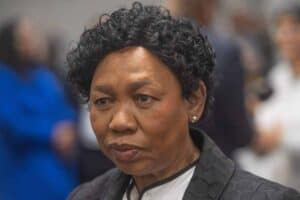Ramaphosa says the former apartheid leader's historic speech on 10 February 1990, when he announced the unbanning of political parties and the release of political prisoners, was a brave act.

President Cyril Ramaphosa says government’s decision to host a state memorial service for the late former deputy president FW de Klerk, was meant to recognise his role and contribution in South Africa’s transition to democracy in the 1990s.
Ramaphosa on Sunday delivered the eulogy at a heavily guarded state memorial service for the last president of apartheid South Africa, who died last month at the age of 85 after a battle against cancer.
The memorial service was held at the Groote Kerk in the Cape Town city centre.
Ramaphosa said in remembering De Klerk by according him a state memorial service as a former deputy president – who served under former president Nelson Mandela from 1994 to 1996 – government recognised that the former apartheid leader’s contribution and legacy remained contested and complex.
‘A brave act’
The fact that it was the struggles of ordinary South Africans that forced De Klerk’s administration to the negotiating table, did not render his contribution to South Africa’s democratic transition any less significant, Ramaphosa said.
He said De Klerk’s historic speech on 10 February 1990, when he announced the unbanning of political parties and the release of political prisoners, was a brave act.
“In taking this bold step, De Klerk heeded the call by Nelson Mandela who, while still incarcerated, told the apartheid rulers that the only way to resolve what he called the perpetual crisis in the country was through negotiations between the ANC and the National Party government.
“In taking such a bold step FW de Klerk went against many in his own party, and against many white South Africans who had been taught about the ‘swart gevaar’, who had been brought up to fear majority rule and to regard black aspirations as a threat to their way of life,” Ramaphosa said.
WATCH: FW de Klerk’s state memorial service
The president praised De Klerk saying he had gone against elements in his own state security apparatus and party, and against die-hards, who were prepared to take up arms to preserve the status quo in South Africa.
And while his predecessors had never managed to cross the Rubicon, Ramaphosa said De Klerk embarked on negotiations with the liberation movements and was brave enough to see them through to their ultimate conclusion.
“We cannot say with conviction what course our country would’ve taken had that speech not been made. We can however say that the country was faced with a choice, between a negotiated settlement and a protracted civil war far more destructive than anything we had experienced before.
“In many ways, the change that took place freed them from their fear of majority rule and made them accept that South Africa belongs to all who live in it as set out in the Freedom Charter.
“It made them realise that the protection of minority rights they sought was inextricably linked with the protection of the rights of all South Africans as clearly enunciated in our constitution.”
Affable and stubborn
Ramaphosa said he came to know De Klerk over many years during negotiations for the country’s constitutional democracy in the 1990s.
He got to know De Klerk first at the Convention for a Democratic South Africa (CODESA) and the multi-party talks, and later in the Constitutional Assembly.
Recalling his encounters with De Klerk, Ramaphosa said they had moments of friendliness and disagreements, but he was always struck by how the former deputy president held strong to his convictions.
“He could be affable but he could also be stubborn,” Ramaphosa said.
“He could be prepared to compromise but he could also dig in his heels. Sometimes he offered me counsel; other times I offered it to him. And there were times when strong words were exchanged between us.
“Yet even in moments of difficulty, at times when we were close to the brink, I found him to be courteous, respectful and committed. FW de Klerk had the courage of his convictions.”
Anger and pain caused
Ramaphosa said South Africans could not ignore nor dismiss the anger, pain and disappointment of those who recall the place De Klerk occupied in the hierarchy of an oppressive state.
“We must never forget the injustices of the past,” the president said.
“We must never forget the atrocities at Boipatong, Bisho, KwaMakhutha, Langa, Soweto and Sharpeville.
“We can never forget the lives that were lost, the families that were torn apart, the land that was taken, the livelihoods that were destroyed, the rights that were denied, and the dreams that were dashed.”
The president said all citizens had the responsibility to help build a new nation and a new society dedicated to the realisation of the potential of all.
“Change did not come soon enough for the many South Africans who lost their lives at the hands of a cruel regime, but change did nonetheless come,” he said.
Compiled by Thapelo Lekabe
NOW READ: De Klerk missed many chances to fully reconcile with South Africans – Tutu foundation






